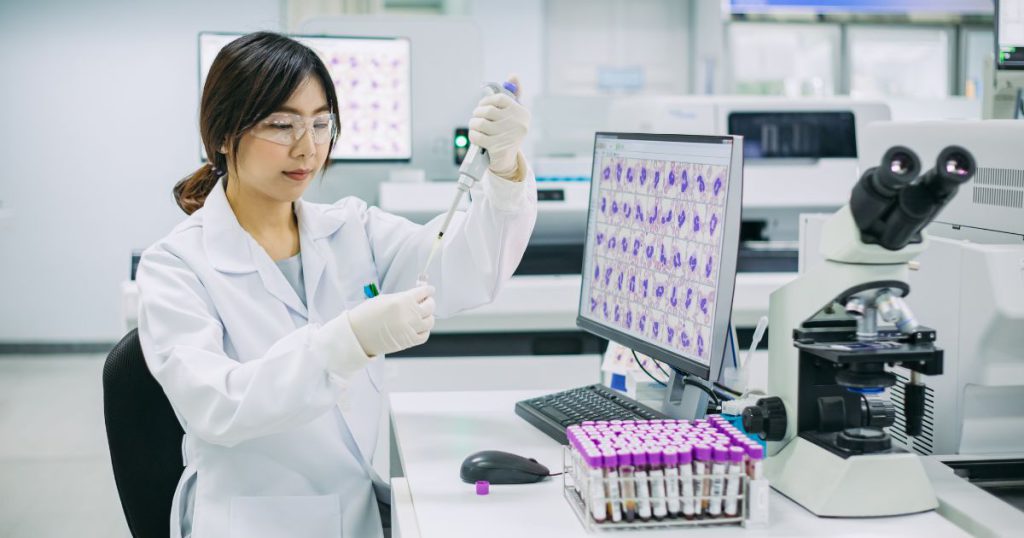Career Prospects: Blood bank technologist
Table of Contents
Blood Bank Technologist
| Key Responsibilities | Skills Required | Career Advancement Opportunities |
|---|---|---|
| Blood typing and cross-matching | Attention to detail | Supervisory roles |
| Screening for diseases | Strong analytical abilities | Specialization (e.g., immunohematology) |
| Managing blood donations | Proficiency in using laboratory equipment | Teaching or research roles |
| Ensuring safety and compatibility of blood for transfusions | Good communication and interpersonal skills | Management roles |
Diving into the world of a Blood Bank Technologist, it’s more than just test tubes and microscopes. It’s about ensuring safe blood transfusions, detecting diseases, and yes, even saving lives. Stick around to uncover the intriguing details of this vital medical profession.

Introduction
Let’s dive into the exciting and rewarding career path of a Blood Bank Technologist, a vital role in the healthcare industry. This profession is not just about technical skills and laboratory work; it’s about saving lives, making a difference, and contributing to the well-being of patients. As a Blood Bank Technologist, you’ll be at the forefront of medical technology, ensuring the safety and compatibility of blood for transfusions. This article will guide you through the ins and outs of this fascinating career, from the qualifications required to the daily responsibilities and the potential for career advancement.
The career path of a Blood Bank Technologist is filled with opportunities for growth and career advancement. With experience, they can move into supervisory or management roles within the laboratory.
Understanding the Role of a Blood Bank Technologist
A Blood Bank Technologist, or immunohematology technologist, plays a crucial role in laboratory analysis, ensuring the safety and compatibility of blood for transfusions. They are the unsung heroes behind the scenes, working diligently to ensure that each unit of blood is safe for transfusion. Their work involves a variety of tasks, from blood typing and cross-matching to screening for diseases and managing blood donations. They are the gatekeepers of the blood bank, ensuring that every drop of blood is safe and ready for use when needed.
The Importance of Blood Bank Technologists in Healthcare
From identifying blood types to detecting diseases like HIV and hepatitis, Blood Bank Technologists are unsung heroes in healthcare. Their work is critical in ensuring the safety of blood transfusions, a common procedure that can save lives in emergencies and during surgeries. They also play a key role in the detection of blood-borne diseases, contributing to the overall health and safety of the community. Without their meticulous work, the risk of transfusion reactions or the transmission of diseases would be significantly higher.
Career Path and Advancement Opportunities
The career path of a Blood Bank Technologist is filled with opportunities for growth and career advancement. With experience, they can move into supervisory or management roles within the laboratory. Some technologists choose to specialize further, becoming experts in areas such as immunohematology or molecular diagnostics. There are also opportunities for teaching, research, and consulting. The demand for skilled Blood Bank Technologists is high, and with the ongoing advancements in medical technology, the field offers a promising and stable career path.
Career Advancement Opportunities for a Blood Bank Technologist
| With Experience | With Further Training |
|---|---|
| Supervisory roles | Specialization (e.g., immunohematology) |
| Management roles | Teaching or research roles |

What skills do you need to be a blood bank technologist?
Becoming a Blood Bank Technologist requires specific qualifications and skills, including a Bachelor’s Degree in Medical Technology or Laboratory Science. In addition to this academic qualification, successful technologists possess a keen eye for detail, strong analytical skills, and the ability to work under pressure. They must be proficient in using laboratory equipment and conducting various tests and procedures. Good communication and interpersonal skills are also important, as they often work as part of a healthcare team and need to communicate their findings effectively.
Qualifications for a Blood Bank Technologist
| Academic Qualifications | Professional Certifications | Practical Experience |
|---|---|---|
| Bachelor’s Degree in Medical Technology or Laboratory Science | Certification from a recognized professional body (optional) | Internship or similar program |
Key Skills for a Blood Bank Technologist
| Technical Skills | Soft Skills |
|---|---|
| Blood typing and cross-matching | Attention to detail |
| Disease screening | Strong analytical abilities |
| Use of laboratory equipment | Good communication skills |
The Role of a Bachelor’s Degree in Medical Technology
An undergraduate degree in Medical Technology or Clinical Laboratory Science is a stepping stone towards a career as a Blood Bank Technologist. This degree provides a solid foundation in the sciences, including biology, chemistry, and microbiology, as well as specialized courses in hematology, immunology, and blood banking. It equips students with the knowledge and skills needed to perform laboratory tests, analyze results, and ensure the quality and safety of blood products.

The Significance of Laboratory Science in This Profession
Laboratory Science forms the backbone of a Blood Bank Technologist’s work, from conducting scientific research to performing experimental analysis. They use their knowledge of laboratory science to perform a variety of tests on blood samples, including blood typing, cross-matching, and screening for diseases. They also use this knowledge to ensure the proper storage and handling of blood products. A strong understanding of laboratory science is therefore essential for success in this profession.
The Critical Role of Analysis in Blood Banking
Analysis is a key aspect of a Blood Bank Technologist’s role, involving meticulous examination and evaluation of blood samples. They analyze blood samples to determine blood type, screen for diseases, and ensure compatibility for transfusion. This requires a high level of precision and attention to detail, as any errors can have serious consequences. Their analytical skills are also important in quality control and in the interpretation of test results.
Key Responsibilities of a Blood Bank Technologist
- Blood typing and cross-matching
- Screening for diseases
- Managing blood donations
- Ensuring safety and compatibility of blood for transfusions
The Lifesaving Procedure of Emergency Transfusion
In critical conditions, the expertise of a Blood Bank Technologist in emergency transfusion can make the difference between life and death. They are responsible for quickly and accurately typing and cross-matching blood to ensure compatibility, a process that can be lifesaving in emergency situations. They also play a crucial role in managing the blood supply, ensuring that there is always enough blood available for emergencies.
As a Blood Bank Technologist, you have the opportunity to make a significant impact in healthcare, ensuring the safety and efficacy of blood transfusions.

Conclusion
As a Blood Bank Technologist, you have the opportunity to make a significant impact in healthcare, ensuring the safety and efficacy of blood transfusions. This profession combines the technical skills of laboratory science with the satisfaction of knowing that your work directly contributes to saving lives and improving patient care. With a strong demand for skilled technologists and a wide range of career opportunities, a career as a Blood Bank Technologist offers both stability and fulfillment.
This post is part of the Career Prospects Category. For more check out Medical Technology Career Prospects: A Student’s Perspective
Have a look at my other posts: Histotechnologist and Clinical chemistry technologist
If you find the captivating world of hematology as intriguing as I do, continue exploring this fascinating field. Visit my Hematology index page or the Hematology category for more in-depth articles and insights.
Other posts of interest: Hematological Disorders: Unlocking the Mysteries of Blood and Basophils and mast cells
Disclaimer: This article is intended for informational purposes only and does not constitute professional advice. Always seek the advice of a qualified healthcare provider with any questions you may have regarding a medical condition or career decisions.
Frequently Asked Questions
What exactly does a Blood Bank Technologist do?
A Blood Bank Technologist is a healthcare professional who specializes in preparing blood and its components for transfusions. They perform a variety of tasks, including blood typing, cross-matching, and screening for diseases to ensure the safety and compatibility of blood for transfusions.
What qualifications do I need to become a Blood Bank Technologist?
The primary qualification is a Bachelor’s Degree in Medical Technology or Laboratory Science. Some positions may also require certification from a recognized professional body. Practical experience, often gained through an internship or similar program, is also beneficial.
Is there a demand for Blood Bank Technologists?
Yes, there is a high demand for Blood Bank Technologists. As medical technologies continue to advance and the need for safe blood transfusions remains constant, the demand for skilled professionals in this field is expected to grow.
What skills are important for a Blood Bank Technologist?
Key skills include attention to detail, strong analytical abilities, and proficiency in using laboratory equipment. Good communication and interpersonal skills are also important, as technologists often work as part of a healthcare team.
Can a Blood Bank Technologist specialize in a particular area?
Yes, with experience and further training, a Blood Bank Technologist can specialize in areas such as immunohematology or molecular diagnostics.
What is the role of a Blood Bank Technologist in emergency transfusions?
In emergency situations, a Blood Bank Technologist is responsible for quickly and accurately typing and cross-matching blood to ensure compatibility for transfusion. Their expertise can be lifesaving in these critical situations.
How does a Blood Bank Technologist contribute to healthcare?
Blood Bank Technologists play a critical role in healthcare by ensuring the safety and efficacy of blood transfusions. Their work directly contributes to saving lives and improving patient care.
What is the career path for a Blood Bank Technologist?
The career path for a Blood Bank Technologist is filled with opportunities for growth and advancement. They can move into supervisory or management roles within the laboratory, specialize in a particular area, or even transition into teaching, research, or consulting roles.
Read More
Faculty of Medical Technology – Mahidol University
Sean Schepers is a third-year Medical Technology student at Mahidol University with a passion for all things health and medicine. His journey into the world of medicine has led him to explore various fields. Sean's blog posts offer a unique perspective, combining his academic insights with personal experiences. When he's not studying or blogging, Sean enjoys keeping up with politics and planning his future career in medicine.
In addition to his studies, Sean serves as the chairman of the Rights, Liberties, and Welfare Committee, a role that reflects his commitment to advocacy and social justice. Beyond his academic pursuits, Sean offers tutoring services in English and Biology, further demonstrating his dedication to education and mentorship. His journey is one of continuous discovery, and he invites others to join him as he explores the dynamic and transformative world of medical technology.


